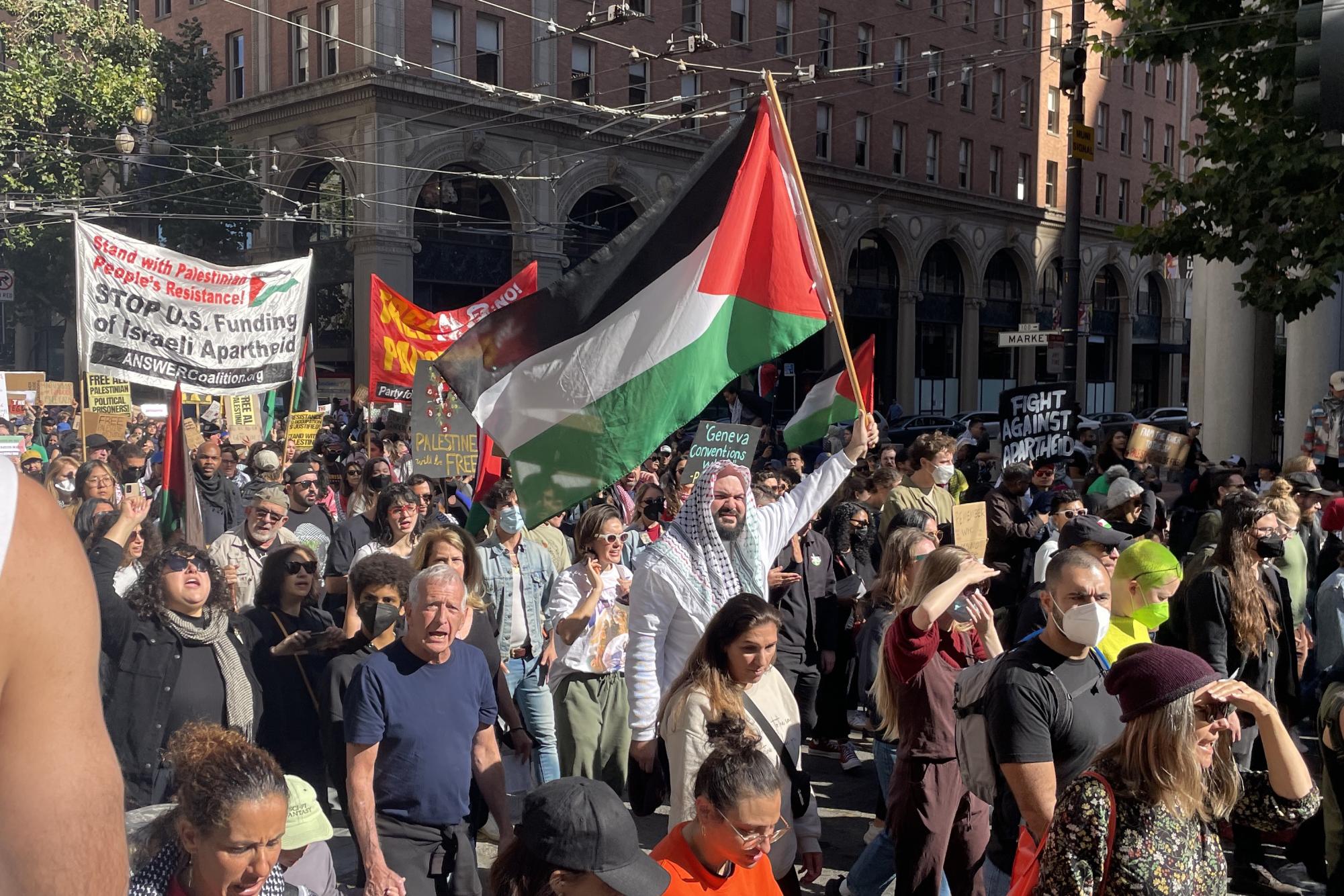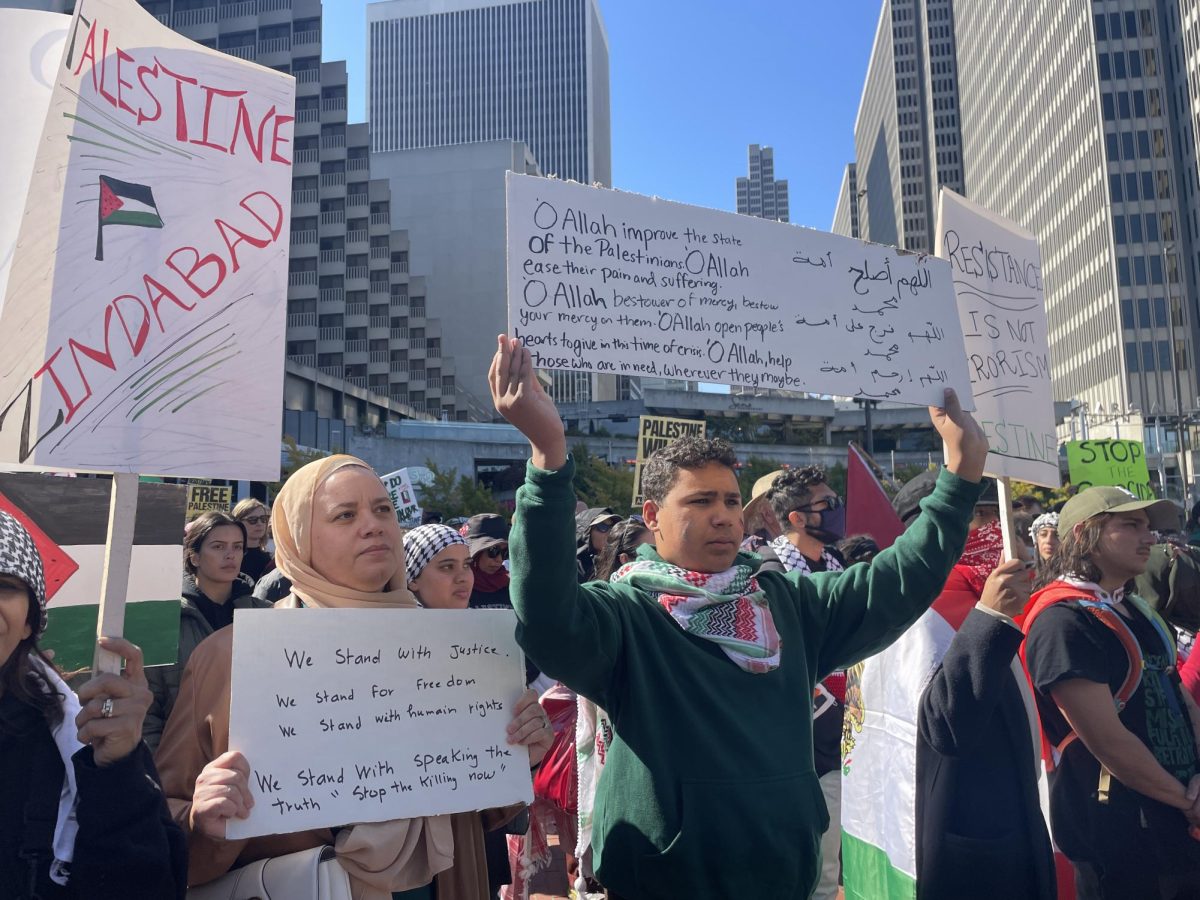Pro-Palestinian protest demands cease-fire in Gaza

“From the river to the sea,” a speaker bellows into a megaphone.
“Palestine will be free,” the crowd chants back.
“Palestine will be free.”
Under a clear blue sky, thousands marched through the streets of San Francisco to call for an immediate cease-fire in the Gaza Strip following weeks of bombing.
According to Al Jazeera, Israel has dropped over 25,000 metric tonnes, or 55.1 million pounds of explosives on Gaza, the equivalent of two nuclear warheads, since Oct. 7. Over 11,000 Palestinians have lost their lives.
Hamas has taken over 240 Israeli hostages from the Gaza-Israel border, according to the New York Times, and is responsible for over 1,200 Israeli deaths, according to Al Jazeera.
Protests like these have occurred in cities across the world in reaction to the numerous human rights violations that have been committed in Israel, in the name of resistance, and in Gaza, in the name of fighting Hamas militants, according to Amnesty International.
“From the river to the sea, Palestine will be free” is a very popular chant in the pro-Palestine liberation movement. The chant means different things depending on the context, and here, many protesters intended it to mean a free region for anyone from the Jordan River to the Mediterranean Sea.
It was important to Somaia Nassef, who brought her husband and two children to the rally, to show support for her community and those she knows are suffering in Gaza right now.
“I have friends who can’t even get in touch with their family in Gaza anymore,” Nassef said.
Since 2014, support for the Israeli government in the US has been mixed. Even since October, Americans have shifted their views of the Israeli government, according to a poll by Ipsos and Reuters.
For Nassef and the thousands of other protesters, the march was a way to show politicians in Washington, many of whom lean towards supporting Israeli military operations, that they’re propping up the wrong side.
“I don’t feel like it’s an altruistic decision to take the stance that they’ve taken — to back Israel. It’s just to serve the interests of the elite in the U.S. It’s devastating to think that, in this day and age, they’re still making choices like that: denying people life, eliminating their humanity, just to keep the seats that they have. It’s really devastating,” Nassef said.
That devastation has been converted into outrage and resistance, as shown by the number of people taking to the streets. Nationwide, protesters have been blocking bridges, holding up ships, and interrupting politicians at dinner to draw attention to the bloodshed in the Middle East.
“I feel horrified, saddened, but also frustrated and angry. I think as working people it always feels like we are powerless, but we really aren’t. We can have the most power in society if we’re organized. If you’re sad, if you’re sitting alone and you’re not really sure what to do, looking at social media all day about this horrible stuff going on, come to a protest, join an organization, and do something about it. I guarantee you, it will turn your frustration and sadness into something productive,” said Luna Osleger-Montañez, who helped organize the protest as part of the Party for Socialism and Liberation (PSL).
Osleger-Montañez said it takes quite a bit of effort in order to put together such a large event, but that they will keep doing so in order to show their support for the Palestinians.
“It takes six times as much work to prepare for something like this as it does to run it on the day of. So we definitely need all the hands we can get to help with making placards, banners, organizing, security, outreach, and making sure people are safe and have water and snacks,” Osleger-Montañez said.
According to Amnesty International, the Israeli government has caused the displacement of hundreds of thousands of Palestinians due to systematic land seizures and demolition that forced people from their homes since 1948. A speaker at the rally sings about the tale of a grandfather who will never be able to touch the roots of the seeds he planted because of such displacement.
Many protesters attended the rally because they felt personally implicated. Danny Kaplan, a data manager at Jewish Voice for Peace, mentioned his belief in the importance of Jewish acknowledgment of Israel’s conduct in Gaza following Hamas’s attack on Oct.7.
“I was at a Jewish gathering when the attack happened, and it was hard to get all of the information. As it was starting to come in, I was very disturbed. I know people who have lost loved ones in Israel, and its also the biggest episode of Jewish death since the Holocaust. I’m also holding the fact that even though it is the largest episode of Jewish death since the Holocaust, it is dwarfed by how many people are dead in Gaza,” Kaplan said.
The situation in Gaza has been described as genocide by many, including Craig Mokhiber in his resignation letter to the U.N. High Commissioner on Human Rights.
Mokhiber stepped down from his position as a director in the New York Office of the High Commissioner for Human Rights (OHCHR) and in his letter, said that the U.N. is failing to prevent what he categorizes as the genocide of Palestinian civilians in Gaza under Israeli bombardment and accuses the U.S., U.K. and much of Europe of being complicit in the violence by arming Israel, according to The Guardian.
According to the OHCHR, U.N. experts warn that “the failure to urgently implement a cease-fire risks this situation spiraling towards a genocide conducted with 21st century means and methods of warfare.”
This has complicated things for many Jewish people, who see pieces of the Holocaust reoccurring in the current attacks on Gaza.
“I’m out here because my grandmother’s brother was in a concentration camp in Germany. He was Jewish during the Holocaust, and I cannot witness people weaponizing the pain from the Holocaust to commit another genocide against innocent people,” said Kira Oliver, another protester.
Grief can make things even more difficult.
“It’s been hard for people who believe in Palestinian liberation and cannot see their grief be recognized on the left. To not see the mass death of Jews be recognized, or to see people who kill Jews celebrated in leftist spaces. It’s hard,” Kaplan said.
Antisemitism, which has caused the mass death of Jews throughout history, still pervades today. According to Kaplan, it has fueled hate towards other groups as well.
“I think that a lot of the institutional Jewish community is farther to the right. People in my Jewish community express a lot of fear to be Jewish, and that fear to be Jewish translates into an expressed need to have armed security and a suspicion or fear towards Arabs or Palestinians,” Kaplan said.
However, Kaplan said that the Jewish Voice for Peace has been growing like never before in the wake of the new conflict, despite community divisions over the subject of Palestinian liberation in the midst of Hamas’ attack.
“A lot of people in the organization that I’m in are wrestling with their relationship to the Palestine solidarity movement. No one that I work with condones what Hamas did, but we also recognize that what happened and Hamas’s ascent is the outcome of a siege, of putting people in open-air prisons and concentration camps for years. How do you square grief, rejection, and opposition to what Hamas did with not undermining the Palestinian liberation movement? It’s complicated,” Kaplan said.
However, above all else, many supporters of Palestine feel a moral obligation to speak up about the violence and war crimes being committed by the Israeli government, including the collective punishment of Palestinian civilians, according to Volker Türk, the U.N. High Commissioner on Human Rights.
Türk also decried Hamas’ murder and mutilation of hundreds of civilians, which included the elderly, women, and children, as well as the taking of hostages as war crimes.
“It complicates things personally, but not morally for me. In my family relationships, yes, it can cause strain among some family members, but it doesn’t complicate my views in terms of my Jewish identity and it’s very closely aligned with my political views on this issue. I think that Jewish people have been fed a lot of misinformation through the Israeli government and the Zionist movement. It’s really important that we educate ourselves and separate antisemitism from criticism of the Israeli government and what they’re doing,” said Lily Friedman, another Jewish attendee at the rally.
In terms of immediate action, calls for a cease-fire were the most prevalent.
“A cease-fire would be nice to start with. Also, just a recognition that the Palestinian people have a right to live just like anyone else and that they have a right to their lands. I don’t personally believe that things are ever going to go back to like they were in 1948, but the U.S. should recognize that the Palestinians, as a nation, have a right to self-determination free of brutality and occupation. I don’t feel like that’s too much to ask,” Nassef said.
In the long term, many call for a more systemic approach to end the humanitarian crisis in Gaza.
“After an immediate ceasefire, you need humanitarian aid to enter the region. You need people to divest from weapons and U.S. weapons manufacturers. You need people in this country to not vote for a president that is going to fund this war. I think the American people need to withhold their money and their votes,” Oliver said.
For many, the hope is that their efforts may allow children in Gaza to one day be able to look up at the same blue sky, free from the fear of bombs raining down upon them.
“We’re Arab, we’re Muslim. If we happened to be in Gaza right now, my boys would have been targeted. They would have potentially been one of the 5,000 children who have been killed,” Nassef said.
That hope may momentarily become reality as a temporary cease-fire agreement has been reached, according to the Associated Press.
Hamas will release 50 hostages in exchange for 150 Palestinian prisoners held in Israeli jails. Those freed on both sides will be women and children. Prime Minister Benjamin Netanyahu also stated that the truce would be extended by a day for every 10 additional hostages returned.
The exchange will accompany a four-day pause in hostilities. During the temporary cease-fire, which is expected to begin on Friday, humanitarian aid will be allowed to enter Gaza through Egypt.
However, many supporters of Palestine are not satisfied with such a temporary solution. Among them is Rep. Rashida Tlaib, the only Palestinian-American congresswoman, who was censured earlier this month for her comments on the ongoing war.
“A temporary pause in the violence is not enough. When this short-term agreement expires, the bombing of innocent civilians will continue. We need a permanent cease-fire that saves lives, brings all the hostages and those arbitrarily detained home, and puts an end to this horrific violence,” Tlaib said in a statement.
As of now, the outcry surrounding the violence in Gaza is fervent, but only time will tell if long-lasting change is made. However, supporters of the Palestinian movement hope that the innocent have not lost their lives in vain and that people will keep speaking out about the atrocities in Gaza.
“What I fear is that people will forget. If there is a cease-fire within a couple of weeks, people will just go back to their normal lives and then behind the scenes, things will continue as they are,” Nassef said. “I hope we never forget.”




